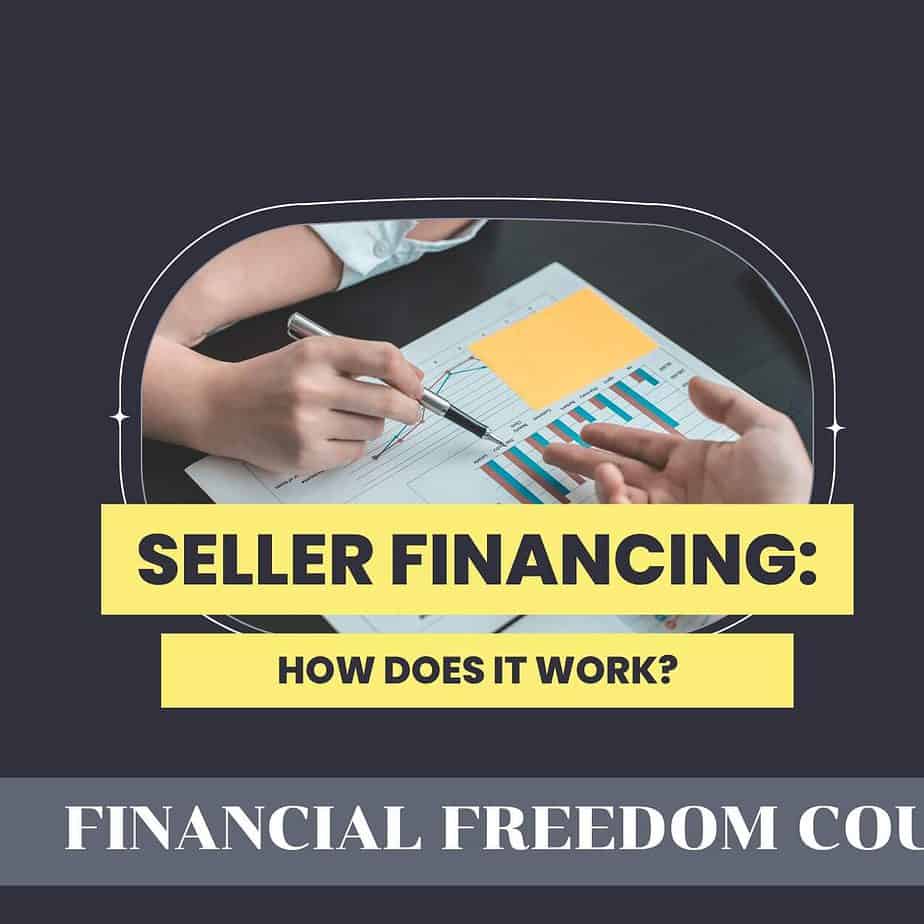Seller Financing: What Is It and How Does It Work?

Are you looking for a way to get into the real estate market?
Seller financing could be an option if you have less than stellar credit and want to buy a primary home.
Seller financing is also a great way to start real estate investing. With seller financing, you can buy a property without going through a bank. It allows you to enter the market sooner and start building property equity immediately.
Seller financing has many positives and negatives for both the buyer and seller, which both parties must consider.
What Is Seller Financing?
Seller financing turns the seller of the property into a lender as well. It can dramatically offer a wide array of mortgage and interest payment options. Such a financing mechanism can lower closing costs and be useful for real estate investors who otherwise want to skip the traditional loan process.
Owner financing and seller financing are the same. It is also called a purchase-money mortgage.
How Does Seller Financing Work?
A buyer and a seller agree on a home’s purchase price. In a normal situation, the buyer would engage in bank financing, get a mortgage, pay in cash, or come up with an alternative way of meeting a down payment and affording the entire property.
Seller financing removes a mortgage lender and bank from the real estate process. Instead, a buyer and a seller will work together to devise terms on down payments, monthly payments, and any other requirements. Lawyers would write these requirements in a promissory note or contract. As such, a seller financing deal can significantly simplify the loan process and eliminate a traditional lender.
Seller financing can be considered one form of creative financing.
One of the most critical components of such a promissory note is the terms, particularly if the buyer defaults on any payments. Indeed, the risk of default is one of the most significant potential cons of seller financing. Seller financing arrangements must be explicit in the interest rate, years of payments, and how a seller will recoup their asset in the event of a default. The advice of a real estate attorney can be critical in ensuring that such a contract is drawn up appropriately for any seller-financed deal.
What Are Typical Terms for Seller Financing?
Seller financing arrangements can vary wildly depending on a variety of factors. However, the buyer and seller will create a real estate agreement that sets the terms of any loan, amortization schedule, down payment, monthly payment, interest rate, and consequences for buyer defaults.
The basic principles between bank financing and seller financing are the same. However, the differences tend to concentrate on interest rates and balloon payments.
Interest Rate
Because there is more credit risk for the seller, interest rates are often higher for seller financing than for bank financing.
Balloon Payment
Furthermore, there is often the potential issue of a balloon payment. A balloon payment is a massive payment due after a certain period. Potentially for the entire remaining balance of the mortgage. The balloon payment will need to be negotiated by the participants, but this can be a very high amount. As such, a buyer must be prepared to make this balloon payment at the end of the set term.
The amount of the balloon payment should not be a surprise. The buyer can save the money necessary to make such a payment. Refinancing is possible at this point, but this may add to the length of the loan or the amount of money you ultimately pay back.
It is worth noting that seller financing will unquestionably operate differently than bank financing. However, that is not to say that it completely changes everything about the real estate process. A buyer will still have to get adequate homeowners insurance, pass government inspections and pay property taxes.
Does Seller Financing Go on Your Credit?
No.
Banks and mortgage companies will report any payments made – or missed – to the major credit bureaus, thus ensuring that your credit scores reflect any charges you are responsible for. Furthermore, they will count your mortgage loan as overall debt that impacts your debt-to-income ratio.
However, seller financing completely removes any bank or mortgage lender from this process. As such, they do not make a report to the credit bureau, and payments you make – as well as debt you take out – do not wind up on your credit report.
One of the most significant pros of owner financing is that it is an option available if you do not have excellent credit scores. Bad credit impacts your interest rate or ability to get a loan.
Identity theft can destroy your credit, and low scores can prove extremely expensive when applying for a mortgage.
Credit Karma partners with Equifax and TransUnion and offers free credit reports and free credit scores updated weekly. It also provides alerts when it detects unusual activity on your credit files. Follow the Credit Karma recommendations on improving your credit.
You can also sign up with Transunion with a paid subscription for additional monitoring and peace of mind.
The owner can – and likely will – require a credit check before offering you any seller financing. Although your payments do not count against your credit score, you may face legal or financial consequences for defaulting on any seller financing agreement. Furthermore, the seller will likely report missing payments or evictions due to missed payments to the credit bureaus.
Types of Seller Financing Agreements
Based on the needs of the buyer and seller, one can have several variations of seller financing agreements. Here are the most common types of seller financing arrangements:
Assumable Mortgage
With an assumable mortgage, buyers can buy a home by taking over the seller’s current mortgage. This type of financing is especially beneficial if the interest rate on the mortgage is low. However, most conventional mortgages are not assumable. Loans that the Federal Housing Administration (FHA) insures or the Department of Veterans Affairs (VA), or the United States Department of Agriculture (USDA) back are assumable if specific requirements are met.
An assumable mortgage is essentially the same as a traditional home loan, but the primary distinction is that the buyer can only finance through the seller’s lender. Lenders must approve an assumable mortgage. If you’re not a qualified current or former military service member, don’t fret; you can still apply for a VA loan assumption.
Lease Purchase
A lease purchase agreement, also known as a rent-to-own contract, is an arrangement under which renters pay sellers an option fee to secure the exclusive right to purchase the property at a set price in the future while continuing to pay the monthly rent to live in the property.
Rent-to-own mobile homes are a common method to increase homeownership for individuals with low liquid net worth.
Wraparound Mortgage
Home sellers turn to wraparound financing when they have an ongoing mortgage on their home. This arrangement allows the owner to sell the house to the buyer. The buyer then makes monthly payments that go towards the down payment and the remainder of what is owed on the property. In other words, those payments are used by the seller to pay down their outstanding mortgage balance.
The buyer usually pays a higher interest rate than what the seller’s current mortgage entails. As a buyer, you could lose ownership of the home if the seller doesn’t make their payments on the loan. To protect yourself in this situation, having an attorney with experience is crucial.
Junior Mortgage
In today’s market, finding a lender willing to finance more than 80% of a home’s value is difficult. By carrying a second or “junior” mortgage, the seller could extend credit to the buyer for the purchase price balance (after subtracting any down payment).
If the borrower defaults, the seller carrying a second mortgage is at risk of receiving lower priority repayment. If there’s a foreclosure or repossession, only after the first mortgage lender is paid off will the proceeds from the sale be used to repay the junior mortgage held by the seller.
Seller Financing Pros for Sellers
There are several benefits to seller financing, including:
- It can save you significant money on capital gains taxes over time. Instead of receiving the house price appreciation in a lump sum, you can spread it out over several years, reducing the tax bracket and, consequently, the total taxes paid. For example, receiving $1 million in one year would be hard to avoid paying the highest tax rates. But if you receive the same payment spread over several years, you can bypass most taxes.
- Shortens the selling time by eliminating the inspection, appraisal, and lending process. A traditional mortgage lender in a bank-financed deal will likely have to adhere to more conventional lending timelines, whereas seller financing will probably be more flexible.
- No need to deal with contractors; you can sell your home “as-is” without making repairs. Suppose you opt for a conventional sale and have structural issues; you must fix them to meet a lender’s appraisal requirements.
- Sellers have an additional exit option to sell the mortgage note to an investor for an up-front payment. Many individuals looking for real estate note investing would be interested.
- Seller financing reduces the risk for sellers. Should the buyer default on their mortgage, the seller can retain the title to their home and any money paid towards it.
- Converts your lumpsum profit into an investment for monthly income.
- Save money on closing costs.
Seller Financing Pros for Buyers
There are several benefits to buying a seller-financed home, such as:
- Buyers have increased access to financing opportunities, especially those with low incomes.
- It allows buyers to finance homes that don’t meet the requirements for conventional financing. One of the common challenges individuals involved with fixing and flipping properties face is that if the houses have structural issues, it is harder to obtain bank loans.
- Save money on closing costs by eliminating appraisal fees, title insurance, bank charges, and possibly inspection expenses.
- Ability to customize monthly payment terms, including eliminating PMI premiums
- Less stringent credit requirements provide greater accessibility for those with poor credit.
- Quicker closing for buyers
- Sellers can remove the down payment minimums required for government-backed mortgages.
Seller Financing Cons for Sellers
- In case of a default, the seller would need adequate emergency funds to pay the property taxes while going through foreclosure.
- The seller is responsible for any repairs or other issues that arise from deferred maintenance if the borrower defaults.
- Home should be owned “free and clear” by the seller with no mortgage since many lenders won’t approve a seller financing arrangement. Government-financed mortgages typically include a due-on-sale clause that requires sellers to pay off the mortgage upon selling the home.
Seller Financing Cons for Buyers
- The interest rates are generally higher with seller financing than with a typical mortgage.
- Borrowers may have to make a significant, final balloon payment at the end of their loan.
- Buyers may assume it is a good time to buy a house now and get stuck with debt when they are in a poor financial position.
- If buyers default in a rent-to-own situation, they will lose the higher monthly payments already made.
- The lack of regulations may be alarming for inexperienced home buyers.
- If the seller of a property does not make their mortgage payments to any senior financing, then the buyer is still vulnerable to foreclosure. The situation could arise if the seller does not own the home and there is an existing mortgage on the property when the seller offers seller financing.
- Seller financing eliminates many traditional participants from the mortgage process, including inspectors, underwriters, and appraisers. Lack of home inspections may result in buyers uncovering issues later, which might be too expensive to fix.
Is Seller Financing Worth It?
Bank financing requires more work and up-front costs and allows for reduced interest payments. The stability and experience that individuals can find with bank financing help explain why most real estate transactions are done this way.
As you can see, seller financing has many positives and negatives. From an investment perspective, seller financing can also expand your portfolio. You can purchase more properties and increase your real estate passive income by using seller financing.
The most important thing you can do is research. Compare the risks of both forms of financing. When evaluating rental properties, run the numbers, including financing costs, and ensure you know which situation is better for you. Once you have all the information in front of you, you can make a more informed judgment about which option increases your average net worth.
FAQs on Seller Financing
How do you make money with seller financing?
The entire capital gain is often taxed when selling property through traditional means.
There can be significant tax savings by using seller financing because the seller won’t receive their payment as a massive lump sum from a bank, instead getting it directly from the buyer over time. One of the most common tax reduction strategies is tax timing. Spreading out a lumpsum payment over several years changes your tax brackets and reduces taxes.
Sellers who offer owner financing can close on their homes faster, as buyers can bypass the lengthy mortgage process. Additionally, sellers may be able to sell their homes as-is and pocket more money from the sale.
In specific cases where the seller’s lender agrees to seller financing, the seller uses the monthly payments by the buyer to pay down their existing mortgage. The buyer’s interest rate is often higher than the seller’s existing mortgage so that the seller can profit from the difference.
Who holds the title in seller financing?
In seller financing, the property owner (the home seller) agrees to let the buyer finance the purchase of their home. The owner keeps the title to the house until the buyer pays the mortgage in full. The process is similar to how a bank would retain the title with a traditional mortgage.
Is seller financing safe?
If both the buyers and sellers take precautions to protect their interests and are aware of the pros and cons, seller financing can be a great way to finance the purchase of a home. The most critical aspect of any financial agreement is that a licensed attorney should prepare a written contract with clearly outlined terms.
Although seller financing does away with the need for an appraisal and inspection set by the lender, buyers should still opt for both to avoid overpaying or dealing with structural issues. Also, sellers are not obligated to do a credit check on the buyer before agreeing to finance the sale; though, it is a smart way to lower risks associated with owner financing and increase the odds of timely payments from the buyer.
What if the buyer defaults?
The effects of a buyer not fulfilling their part of a seller financing agreement depend on the type of agreement signed.
For example, if it was set up as a lease option, eviction is necessary to get rid of the buyer. If it was an installment sale contract, the sellers could initiate foreclosure on the buyer, depending on local laws.
With a written financing agreement, sellers can cover themselves from potential unknowns and set realistic expectations for the buyer. It would involve specifying what is considered late payment, if there is a grace period, and what occurs when the borrower does not meet their end of the deal.
Since the seller is the lender, they have the same rights as a bank and can foreclose on the property
What are some negotiating tips for seller financing?
1. Determine the seller’s motives to understand what will prompt them to take action.
2. Use some of the pros of seller financing to convince the seller.
Building a rapport with the seller is crucial when making a purchase. Could you get to know them on a personal level?
3. Try to understand what stresses them out or the challenges they might face when selling the property. This will give you greater insight into how best to communicate effectively.
4. Show genuine interest. Be engaged by being willing to compromise and meet the seller mid-way.
5. Influencing and negotiations are high-income skills useful in personal and professional life. Seek opportunities to practice them often
6. Follow up regularly. Don’t expect to sway the seller in a single conversation. Exchange contact details and be in touch regularly.

John Dealbreuin came from a third world country to the US with only $1,000 not knowing anyone; guided by an immigrant dream. In 12 years, he achieved his retirement number.
He started Financial Freedom Countdown to help everyone think differently about their financial challenges and live their best lives. John resides in the San Francisco Bay Area enjoying nature trails and weight training.
Here are his recommended tools
M1 Finance: John compared M1 Finance against Vanguard, Schwab, Fidelity, Wealthfront and Betterment to find the perfect investment platform. He uses it due to zero fees, very low minimums, automated investment with automatic rebalancing. The pre-built asset allocations and fractional shares helps one get started right away.
Personal Capital: This is a free tool John uses to track his net worth on a regular basis and as a retirement planner. It also alerts him wrt hidden fees and has a budget tracker included.
Streitwise is available for accredited and non-accredited investors. They have one of the lowest fees and high “skin in the game,” with over $5M of capital invested by founders in the deals. It is also open to foreign/non-USA investor. Minimum investment is $5,000.
Platforms like Yieldstreet provide investment options in art, legal, structured notes, venture capital, etc. They also have fixed-income portfolios spread across multiple asset classes with a single investment with low minimums of $10,000.







Nice article. One thing I notice that got glossed over slightly was what happens if the buyer defaults. In this situation the lender (the former owner / seller) will have all the rights that a bank does. You can foreclose or do a deed in lieu of foreclosure.
Great clarification. Yes, the seller is the lender and has all the rights of a lender.